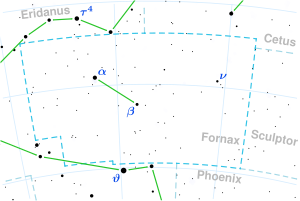Gamma2 Fornacis
| Observation data Epoch J2000.0 Equinox J2000.0 (ICRS) | |
|---|---|
| Constellation | Fornax |
| Right ascension | 02h 49m 54.1822s[1] |
| Declination | −27° 56′ 31.123″[1] |
| Apparent magnitude (V) | 5.389[2] |
| Characteristics | |
| Evolutionary stage | Main sequence[3] |
| Spectral type | A1 V[4] |
| B−V color index | 0.013±0.004[5] |
| Astrometry | |
| Radial velocity (Rv) | 24.0±4.2[6] km/s |
| Proper motion (μ) | RA: −47.053[1] mas/yr Dec.: 20.932[1] mas/yr |
| Parallax (π) | 6.3134 ± 0.1330 mas[1] |
| Distance | 520 ± 10 ly (158 ± 3 pc) |
| Absolute magnitude (MV) | −0.35[5] |
| Details | |
| Mass | 2.40+0.44 −0.38[2] M☉ |
| Radius | 4.488[7] R☉ |
| Luminosity | 117.073±0.111[7] L☉ |
| Surface gravity (log g) | 3.50±0.25[2] cgs |
| Temperature | 9,000±500[2] K |
| Metallicity [Fe/H] | −0.02[8] dex |
| Rotational velocity (v sin i) | 149[3] km/s |
| Age | 401+138 −170[2] Myr |
| Other designations | |
| Database references | |
| SIMBAD | data |
Gamma2 Fornacis, a name Latinized from γ2 Fornacis, is a single[10] star in the southern constellation Fornax. It has a white hue and is faintly visible to the naked eye at night with an apparent visual magnitude of 5.4.[2] The distance to Gamma2 Fornacis is approximately 520 light years based on parallax.[1] It is drifting further away with a radial velocity of 24 km/s.[6] Gamma1 Fornacis is a 6th magnitude star about four degrees to the north.[11]
The stellar classification of Gamma2 Fornacis is A1 V,[4] which is notation for an A-type main-sequence star that, like the Sun, is generating energy through core hydrogen fusion. Comparison of its properties to theoretical models suggest an age of about 400[2] million years old. It has a high rate of spin, showing a projected rotational velocity of 149 km/s.[3] The star has 2.4[2] times the mass of the Sun and 4.5[7] times the Sun's radius. It is radiating 117[7] times the luminosity of the Sun from its photosphere at an effective temperature of roughly 9,000 K.[2]
References[edit]
- ^ a b c d e f Brown, A. G. A.; et al. (Gaia collaboration) (August 2018). "Gaia Data Release 2: Summary of the contents and survey properties". Astronomy & Astrophysics. 616. A1. arXiv:1804.09365. Bibcode:2018A&A...616A...1G. doi:10.1051/0004-6361/201833051. Gaia DR2 record for this source at VizieR.
- ^ a b c d e f g h i Gullikson, Kevin; et al. (2016). "The Close Companion Mass-ratio Distribution of Intermediate-mass Stars". The Astronomical Journal. 152 (2): 40. arXiv:1604.06456. Bibcode:2016AJ....152...40G. doi:10.3847/0004-6256/152/2/40. S2CID 119179065.
- ^ a b c Zorec, J.; Royer, F. (2012). "Rotational velocities of A-type stars. IV. Evolution of rotational velocities". Astronomy and Astrophysics. 537: A120. arXiv:1201.2052. Bibcode:2012A&A...537A.120Z. doi:10.1051/0004-6361/201117691. S2CID 55586789.
- ^ a b Houk, N. (1982). Michigan Catalogue of Two-dimensional Spectral Types for the HD stars. Declinations -40_ƒ0 to -26_ƒ0. Vol. 3. Bibcode:1982mcts.book.....H.
- ^ a b Anderson, E.; Francis, Ch. (2012). "XHIP: An extended hipparcos compilation". Astronomy Letters. 38 (5): 331. arXiv:1108.4971. Bibcode:2012AstL...38..331A. doi:10.1134/S1063773712050015. S2CID 119257644.
- ^ a b Gontcharov, G. A. (2006). "Pulkovo Compilation of Radial Velocities for 35 495 Hipparcos stars in a common system". Astronomy Letters. 32 (11): 759–771. arXiv:1606.08053. Bibcode:2006AstL...32..759G. doi:10.1134/S1063773706110065. S2CID 119231169.
- ^ a b c d McDonald, I.; et al. (2017). "Fundamental parameters and infrared excesses of Tycho-Gaia stars". Monthly Notices of the Royal Astronomical Society. 471 (1): 770. arXiv:1706.02208. Bibcode:2017MNRAS.471..770M. doi:10.1093/mnras/stx1433.
- ^ Anders, F.; et al. (2019). "Photo-astrometric distances, extinctions, and astrophysical parameters for Gaia DR2 stars brighter than G = 18". Astronomy and Astrophysics. 628: A94. arXiv:1904.11302. Bibcode:2019A&A...628A..94A. doi:10.1051/0004-6361/201935765. S2CID 131780028.
- ^ "gam02 For". SIMBAD. Centre de données astronomiques de Strasbourg. Retrieved 2021-01-17.
- ^ Eggleton, P. P.; Tokovinin, A. A. (September 2008). "A catalogue of multiplicity among bright stellar systems". Monthly Notices of the Royal Astronomical Society. 389 (2): 869–879. arXiv:0806.2878. Bibcode:2008MNRAS.389..869E. doi:10.1111/j.1365-2966.2008.13596.x. S2CID 14878976.
- ^ Sinnott, Roger W.; Perryman, Michael A. C. (1997). Millennium Star Atlas. Vol. 1. Sky Publishing Corporation and the European Space Agency. p. 381. ISBN 0-933346-84-0.

